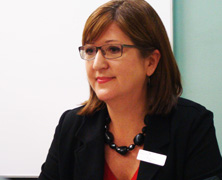I learned early on that you won’t know everything and, in fact, you don’t have to.
At work, I surround myself with others who bring expertise and strengths that complement mine. I have a diverse team of people who I trust and respect, and who also trust and respect me. That way, I am not alone, and our collective decisions are always well thought out and strategic from various perspectives.
I always share our successes and accomplishments, and recognize the contributions and achievements of team members. They are engaged and committed, and they work hard for me and for the organization. Feeling part of a strong and supportive team in my leadership role has been critical for my career fulfillment.
At the same time, I have learned that I also need to have that team in my personal life—people who support and believe in me. It is my responsibility to take care of myself, both physically and emotionally, and to take time away from work to self-reflect, rejuvenate, and find balance. This too is an essential part of my career fulfillment.
On Getting People to Know Who You Are and What You Can Do
You need to be patient about career recognition. If you focus on hard work, on respecting and learning from others, and on creating impact in areas you genuinely believe in, recognition will come.
You build awareness and recognition of what you can do by being authentic and honest; in your communication, in your professional relationships, and in the issues you take on. Also, I try to always follow through with my commitments, and I don’t take things on that I don’t think I can do.
Finally, be collaborative and inclusive. Keep partners, colleagues, and employees informed and engaged in what you want to accomplish—in the challenges and the successes. Clear and open communication tells people who you are, builds trust, and keeps people interested in you.
On Finding Success and Staying Competitive
I work in the not-for-profit sector, where the ability to be collaborative and work in partnership towards “collective impact” is critical. However, I also run a business where strategic leadership and decision-making, resource development, and business management skills are also necessary. Success comes from being able to find a balance between these skills sets.
On the Importance of Role Models and Mentors
A professor in a nonprofit management program I participated in soon after I had started in my ED role here at ACCES was a mentor. He was the first person to tell me that he saw true leadership qualities in me. That recognition gave me confidence in myself, and it meant the world to me as I took on my first real leadership role.
On Facing Challenges
There have been many challenges in my career. However, I have learned to see that every challenge brings learning and growth. And once you have overcome each challenge, you are a stronger and more confident leader.
Allison’s Advice to Young Women Starting Careers
Always be true to yourself and honest with others. Don’t ever try to be someone that you are not, admit when you don’t know things, and seek help from others. Focus on your strengths and the strengths of others.








Well deserved….congrats Allison